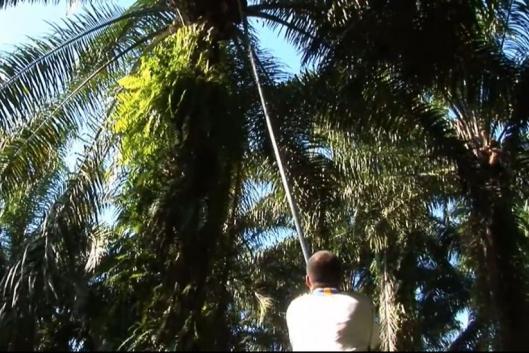The documentary video “Bajo Aguán: Grito por la Tierra” (Bajo Aguán: Cry for the Land) (1) was presented in Honduras on December 10 during a Human Rights Forum organized by the Committee of Relatives of the Detained and Disappeared in Honduras.
The documentary is aimed at exposing to the international public the state of constant threat faced by peasant farmers in the Bajo Aguán region of Honduras. Its goal is to “unmask an exploitative model of production, based on large-scale monoculture plantations, in this case of oil palm, which violates human rights in the broadest sense.
The oil palm plantation industry concentrates land ownership, displaces local populations, and denies them the right to access to land, infringing on their food sovereignty. But it also criminalizes and violently represses social protest, denying the most basic rights to thousands of organized peasant families,” said Giorgio Trucchi, a Rel-UITA correspondent, at the presentation of the video. (2)
The Inter-American Development Bank (IDB) began to promote monoculture oil palm plantations in Honduras in the 1970s. Beginning in the 1990s, the Law on the Modernization and Development of the Agricultural Sector fostered land grabbing and the concentration of land ownership, mainly in the hands of three very powerful economic groups, and promoted large-scale plantations.
Over time, and in response to the growing world demand for palm oil, the large landholders tried to forcibly evict thousands of peasant families in order to expand their plantations.
But the peasants also needed land, especially after Hurricane Mitch in 1998, which left many families destitute. From that point on, peasant farmers created a large number of cooperative agricultural ventures on Agrarian Reform lands which benefited more than 20,000 people. Beginning in 2000, after drawn-out and fruitless negotiations, the peasants decided to recover their lands, initiating a process of taking back lands planted with oil palm which they claimed as their own. (3)
The land conflict intensified against an increasingly polarized political backdrop, until the most conservative sectors staged a coup d’état in 2009. The new government of right-wing Porfirio Lobo did not provide a solution for the needs of the peasants. It was then that the peasant organizations launched a major offensive to recover more than 20,000 hectares of land. The reaction was swift: as the peasant mobilization grew stronger, the repression, torture and murder of peasant farmers were stepped up. The perpetrators were different actors in the service of large landholders in the region.
Although the situation now appears to have been normalized, the tension in the Bajo Aguán continues, and the repression of the peasant movement – organized in the struggle to defend their right to the land – has expanded in a context of total impunity. Those responsible for these crimes and human rights violations have never been charged.
“After the coup, human rights violations have grown much worse here, because there have been more murders. These are no longer sporadic murders, but are now carried out continuously. The problem is that the authorities have always governed for the oligarchy, for the big business owners. And so here, for the neediest people, for the poorest, there is no justice. This is the problem that the peasants have faced. They have been murdered, they have been shot at, and they have been persecuted,” Haydee Sarabia, general secretary of the Coordinating Committee of Popular Organizations of the Aguán Valley (COPA), declares in the video.
According to Gilberto Ríos of FIAN Honduras, the large landholders “have also created a private army with security guards who at some point could even be considered mercenaries. They capture, torture and investigate as if they were a state institution. Most of the murders that have occurred in the Bajo Aguán have been attributed to the security guards.”
But, despite the repression, peasant farmers continue to organize in the Bajo Aguán, defending their right to the land. “We have many peasant comrades who have died for the same cause, because our crime is that of fighting back, of reclaiming our rights, our lands, where as peasant farmers we grew corn, beans, cassava, all those things, and suddenly the landowner doesn’t want us to, he says that we peasants cannot cultivate our land. But that is why we are fighting, and we will continue to fight with our banner held high,” declares Francisco Correa, of the Nueva Vida community.
1.- Video produced by Alba Sud and Rel-UITA, with the collaboration of the World Rainforest Movement (WRM), FIAN International and the Coordinating Committee of Popular Organizations of the Aguán Valley (COPA). The video is available in Spanish at: http://wrm.org.uy/videos/bajo-aguan-cry-for-the-land/
The video will soon also be available in English, French and Portuguese.
2.- See “Monocultivo: Un ataque directo a la soberanía alimentaria. Fue presentado video sobre el Bajo Aguán”
http://www6.rel-uita.org/agricultura/alimentos/soberania_alimentaria/monocultivo-ataque_directo_a_la_soberania_alimentaria.htm
3.- See WRM Bulletin 176 http://www.wrm.org.uy/boletin/176/Honduras.html
